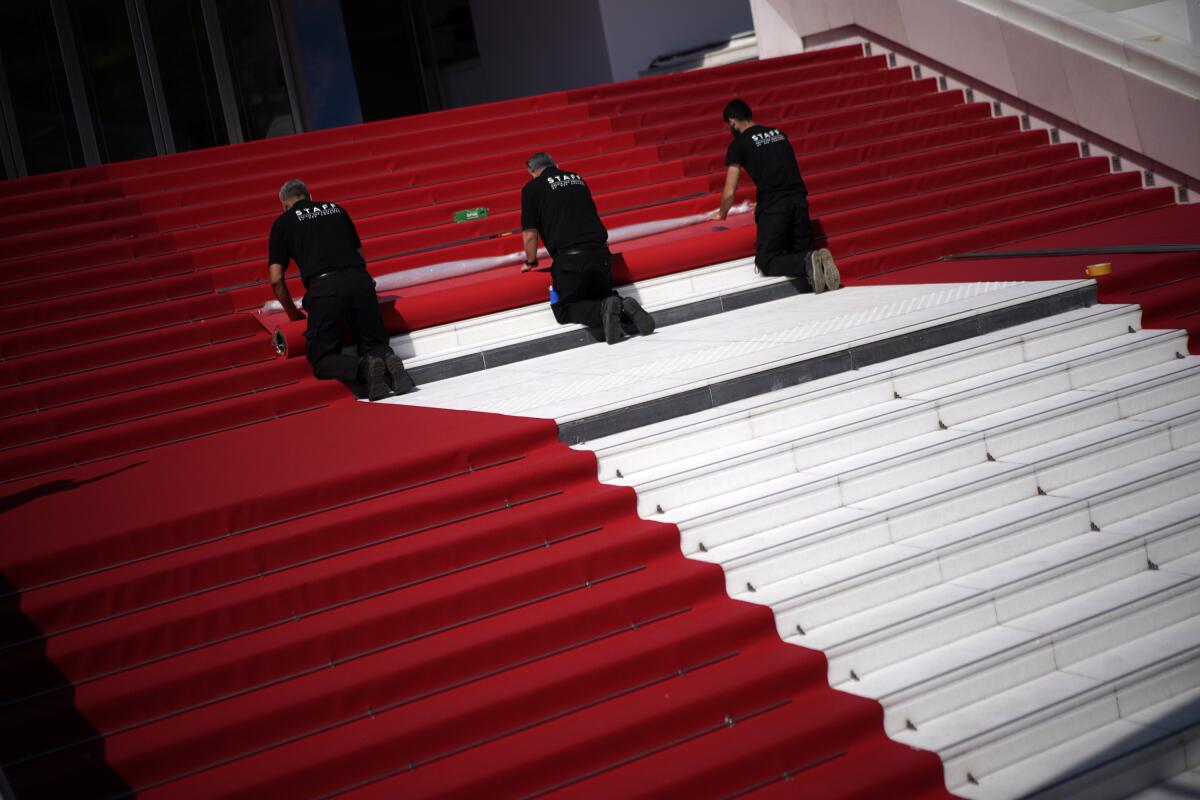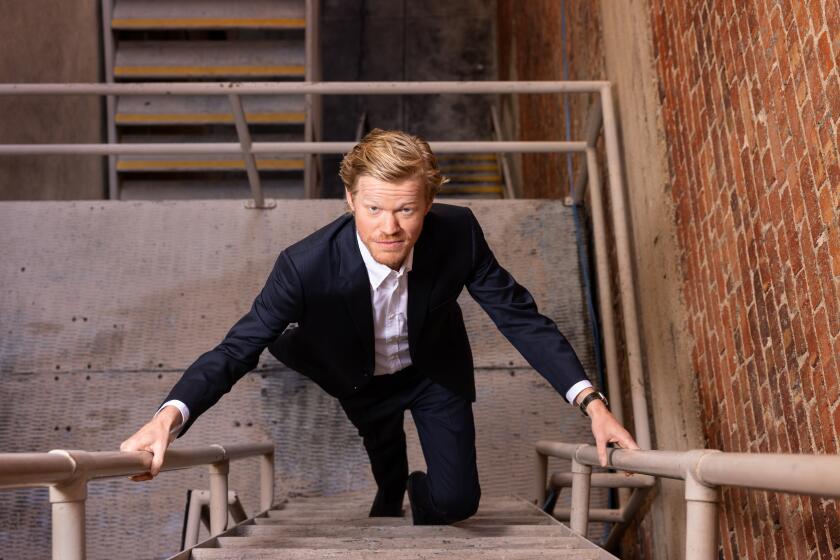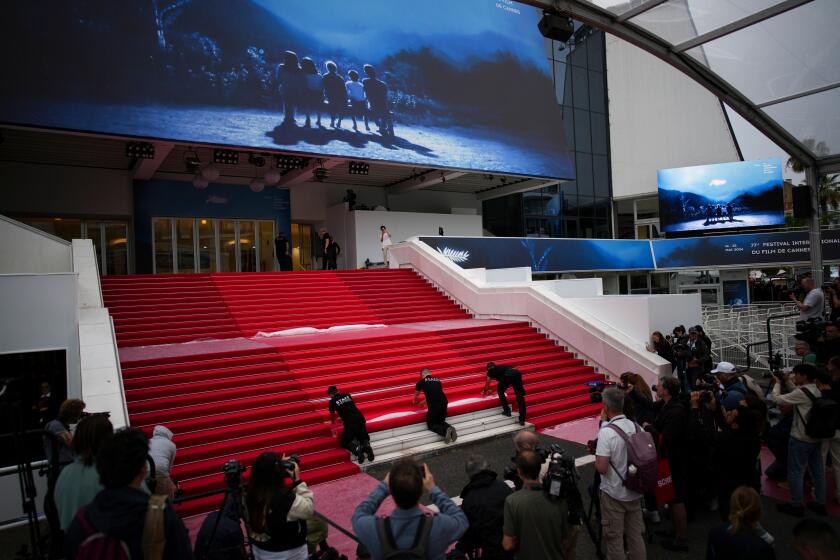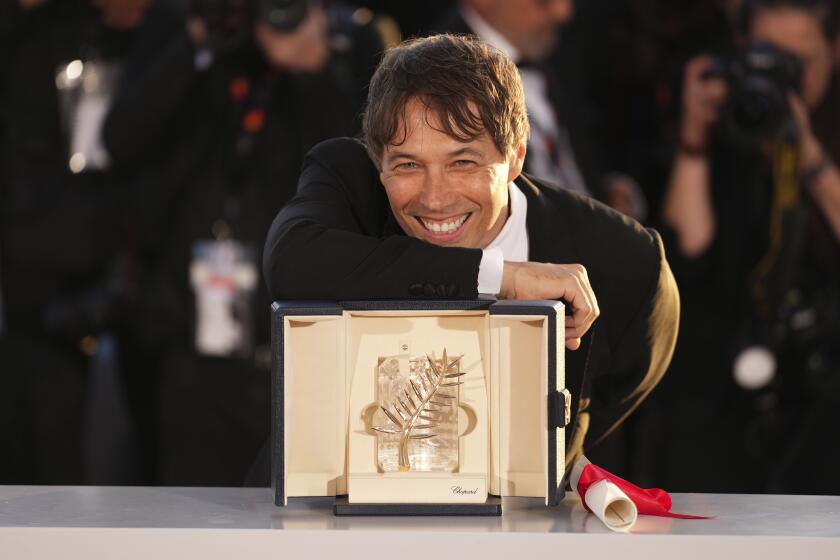This Cannes Film Festival could be the most explosive in years. Here’s what to expect

Amid a writers’ strike in Hollywood and labor unrest in France, the 2023 edition of the Cannes Film Festival features controversial stars (Johnny Depp), beloved auteurs (Martin Scorsese) and blockbuster movies (“Indiana Jones”). Film critic Justin Chang and columnist Mary McNamara broke down the potential storylines from this year’s festival before hopping on a plane overseas to cover it in person.
Chang: First things first, Mary: I’m delighted that we’ll be covering the 76th Cannes Film Festival together, especially since this marks your return for the first time since 2005. We just missed each other! I started attending the festival in 2006, and I’ve missed only one edition since: the sparsely attended 2021 festival, held during the initial stages of COVID recovery. Now, of course, Cannes is more or less back in full swing; I didn’t see a lot of masked faces in theaters when I came back last year, and I expect to see even fewer this week. No one’s really talking about the pandemic; they’re too busy talking about the Martin Scorsese movie, the Wes Anderson movie and, of course, the “Indiana Jones” movie. (Désolé, I mean the new James Mangold movie; Cannes loves its auteurs.)
Those three marquee titles — “Killers of the Flower Moon,” “Asteroid City” and “Indiana Jones and the Dial of Destiny,” respectively — are among the biggest attractions of this year’s Cannes. Certainly, they’ll be among the hottest tickets for journalists, especially for American journalists eager to convince their editors back home that a trip to the south of France was worth it. I’m looking forward to seeing all of them here in the Palais des Festivals, the event’s headquarters, with its massive theater screens and second-to-none projection standards. But I’m also looking forward to, well, a lot of other things, none of which will attract as much ink as Leonardo DiCaprio or Harrison Ford, of course, but which might prove to be no less worthy of the attention.
What might those great discoveries be? I don’t know; that’s why they’re called discoveries. But I’ll start by noting that Jonathan Glazer’s Holocaust drama, “The Zone of Interest,” has very much piqued my interest. Like Anderson’s “Asteroid City,” Glazer’s film is one of 21 features competing for the prestigious Palme d’Or; the others include “Monster,” the latest from Cannes perennial Hirokazu Kore-eda; “May December,” a new drama from Todd Haynes starring Julianne Moore and Natalie Portman; and “La Chimera,” the latest from Italy’s Alice Rohrwacher (“Happy as Lazzaro”).
I’m just scratching the surface, but I’ve scratched it long enough — Mary, what are you excited about this Cannes? No less importantly, what are you not excited about?
In Screen Gab No. 41, we mark the official start of summer with YA, trashy reality, art house movies and more.
McNamara: Well, any film festival that opens with Johnny Depp’s return to the big screen (as opposed to the small ones on which so many watched him win his often bizarre and inevitably painful defamation trial against ex-wife Amber Heard) is certainly making choices. Directed by Maïwenn, currently being sued for allegedly assaulting a French journalist, and funded in part by Netflix, which is at the heart of the current Writers Guild strike, “Jeanne du Barry” may be a period piece about the court of Louis XV but it is firmly rooted in the modern world.
An optimistic reading of the king’s famous motto — après moi le déluge — refers to what will be, with any luck, a deluge of terrific films. Still, with writers picketing many of the studios and platforms that will be at the fest, and in light of Netflix co-Chief Executive Ted Sarandos’ recent claim that international content will help the streamer survive the strike, I wonder what sort of note all the beauty and glamour of Cannes will hit. A much-needed celebration of films (and the people who write them)? Or an out-of-touch Versailles?
That said, I am truly excited to see as many of the films, in competition and out, as possible, especially given the record-breaking number of female directors in competition — seven out of 20 is not exactly gender parity, but it’s much better than most years.
Also, I would be lying if I didn’t confess to being absurdly excited over “Indiana Jones and the Dial of Destiny,” as well as the films you mention. I’m also looking forward to a remarkably good documentary lineup. There are two in competition — Kaouther Ben Hania’s “Four Daughters” and Wang Bing’s “Jeunesse” — and I’m deeply intrigued by “Occupied City,” Steve McQueen’s four-hour contemplation of Amsterdam during World War II. Four hours seems long, but who among us hasn’t lost that much time to our favorite binge?
Chang: I’m sure all those folks grumbling about the rumored four-hour length of Scorsese’s “Killers of the Flower Moon” will be relieved to hear that, per the festival’s official schedule, it actually clocks in at a svelte three hours and 26 minutes. Cannes has long been known for its marathon running times: It’s no surprise to hear that the Turkish auteur and Palme laureate Nuri Bilge Ceylan, never one to be hurried (or underestimated), is returning to the competition with a three-hour-and-17-minute opus called “About Dry Grasses.” Wang’s “Jeunesse,” at three hours and 32 minutes, is longer still. And McQueen’s “Occupied City,” at four hours and change, might be the longest title in the entire festival, rivaled only by the 254-minute restoration of Jacques Rivette’s “L’Amour Fou” (1969) that will be opening the festival’s Cannes Classics program.
Here it’s worth noting that we could both have a delightful festival simply by confining ourselves to the offerings in this retrospective sidebar. Among this year’s Cannes Classics selections are two films by the Japanese master Yasujiro Ozu, “Record of a Tenement Gentleman” (1947) and “The Munekata Sisters” (1950); restored versions of Alfred Hitchcock’s “Spellbound” (1945) and Claude Sautet’s “Classe Tous Risques” (1960); and “Caligula: The Ultimate Cut,” a two-hour, 54-minute new version of that notorious 1979 hardcore history lesson, which is said to contain a lot of previously unseen footage. If it were in competition, it’d be a shoo-in for the Palme d’Orgy.
So that sounds like something to see. And so, I suppose, does “Jeanne du Barry,” which Cannes seems to have deliberately programmed on opening night as a kind of tantalizingly toxic Depp-Maïwenn double whammy. They’d deny it, of course; Thierry Frémaux, the festival’s longtime head honcho, said in an interview with Variety’s Elsa Keslassy that he doesn’t see it as “a controversial choice.” Be that as it may, this is a festival that, far from shying away from scandale, knows full well that it has its place, especially on the red carpet. Will the movie be any good? The question, and the answer, seem almost beside the point. Either way, it will serve its purpose.
Maïwenn, for what it’s worth, is never far from Cannes; her emotionally unruly, critically polarizing movies (including “Polisse” and “My King”) have won awards here in the past. She isn’t in competition this time, though as you pointed out, Mary, there are more female directors than there usually are. I’m especially curious about “Club Zero,” a boarding-school drama directed by Austria’s Jessica Hausner and starring Mia Wasikowska. And then there’s the erotic thriller “Last Summer,” the first new movie in a decade from the French director Catherine Breillat, who’s known for shaking and heating things up with movies like “Fat Girl” and “The Last Mistress.” I can’t wait to see what she’s been up to.
Several new series and new seasons are set to air this summer, but some shows will also be ending. Here, our writers share what shows they are most anticipating.
McNamara: And let’s not forget HBO’s already controversial “The Idol,” starring Abel Tesfaye (better known as the Weeknd) and Lily-Rose Depp. Beyond bringing the obvious Depps-do-the-Riviera vibe, Sam Levinson‘s follow-up to “Euphoria” has been the subject of allegations that the project devolved into a “s— show” and rape fantasy, as well as reports that original director Amy Seimetz departed the series because Tesfaye complained the point of view was skewing too female.
But seriously, Justin, seeing you list all those titles, never mind having just received the official schedule, I am kind of freaking out — how on earth is a person supposed to choose? As an addictive personality, I want to see everything, which is not only physically impossible but also mentally inadvisable.
Though not a festival veteran like yourself, Justin, I have been to enough to know that the euphoria and fatigue of watching three or four (apparently super-long) movies a day can create a festival fugue state. For me, this can lead to many regrettable nutritional choices (how many kebabs can a person reasonably eat in a week?) and a propensity for standing ovations (if nothing else, they provide a little exercise and proof of life — I clap therefore I am).
Since, as you point out, it’s been a hot minute (as in 17 years) since I’ve been to Cannes, I am interested in seeing what has changed (the entire world) and what has not (Wes Anderson). I see in the rules that women are now, in fact, allowed to wear flats on the red carpet, but what will happen if I actually do? (I’m thinking I’ll carry a pair of heels just in case.)
There is much to be said for Cannes being an ever-fixed mark in the cinematic landscape, so a part of me is hoping I will feel transported, if not back in time then briefly outside of it. Still, the WGA is not the only union with beef — virtually every union in France is protesting President Emmanuel Macron’s proposed pension reforms. The National Federation of Mines and Energy recently threatened to literally pull the plug on the film festival.
Just as you can’t make a movie without a script, it’s pretty hard to have a film festival without electricity. So don’t forget to pack an extra portable charger!
Chang: I’ve seen plenty of bad movies in Cannes, Mary, but I’ve seldom had a bad kebab (and I’ve eaten a lot of kebabs). As for the festival, a lot of the rituals that make Cannes so very Cannes persist. The security guards still wand you at the Palais entrance before sending you off with a friendly “Allez-y.” People still yell “Raoul!” as the movie begins (don’t ask). Oh, and Mary, when you were last here in 2005, the festival included new films by Wim Wenders, Amat Escalante and Kim Jee-woon; this year’s festival does too. (As I said, Cannes loves its auteurs.)
Then again, much has indeed changed. For one, there’s now an online ticketing system for screenings, which will likely be both our scourge and our salvation. More seriously, over the last 17 years, the festival has taken a lot of criticism for its treatment of women, whether on the red carpet or in ( and out of) the competition. It has made commitments to gender parity and strived to acknowledge #MeToo; I won’t soon forget Asia Argento’s fiery speech at the festival in 2018, in which she referred to the Cannes of yesteryear as Harvey Weinstein’s “hunting ground.” But the festival has also continued to make programming choices that can seem, shall we say, at odds with that commitment. (No, I still haven’t forgotten or forgiven “Mektoub, My Love: Intermezzo,” Abdellatif Kechiche’s execrable 3 1/2-hour ass-a-thon from 2019.)
I’m glad you brought up the writers’ strike, Mary, as it will be interesting to see to what extent, if any, Hollywood’s labor woes will make themselves felt at a festival where Hollywood itself is an undeniable yet happily outnumbered presence. And yet France is, as you note, a country by turns riven, united and defined by protest. Are we in for “Indiana Jones and the Red Carpet Picket Line”? Will there be strikers waving signs outside the Palais, or just the usual bunch of festivalgoers requesting last-minute tickets (“Une admission s’il vous plaît”)? We shall see, Mary. On y va!
More to Read
Only good movies
Get the Indie Focus newsletter, Mark Olsen's weekly guide to the world of cinema.
You may occasionally receive promotional content from the Los Angeles Times.














